新概念英语第二册第20课
新概念英语第二册第二十课课后习题答案详解 Lesson

新概念英语第二册第二十课课后习题答案详解Lesson 201. b根据课文第4行 I never catch anything---not even old boots, 只有 b. nevercatches anything 与课文实际内容相同,而其他3个选择都与课文内容不符。
根据课文最后一句I am only interested in sitting in a boat and doing nothingat all! 只有c. doing nothing 是正确答案,而其他3个选择都不符合课文内容。
本句是对主语提问的,回答是. who (谁)是对主语提问的;c. whom(谁)是对宾语提问的;d. whose(谁的)确是对定语提问的;只有b. which 是对做主语的事物提问的,所以选b.本句是带never的否定句,只有b. anything 可以用在否定句中。
而a. nothing若用在否定句中,就会使原句变成肯定意义的句子,不符合题目意思;c. something 只能用于肯定句中;d. everything 也不能用在否定句中。
前面句子 I am even less lucky 中的 less(不及)是表示否定意义的比较级,只有c. not so是表示否定意义的,而其他3个选择都没有否定的意思.只有b. an empty bag 最符合语法。
而其他3个选择都有语法错误。
a. a empty bag 中empty是以元音开头的,前面不能用a 而应该用an; c. empty bag 中 bag 是可数名词,需要用an 来修饰;d. oneempty bag 不符合习惯用法,单数可数名词前通常用不定冠词a 或an 修饰,除非表示强调才用one 修饰。
因此应该选b.只有c. all 才能使这个句子同前一句I am only interested in doingnothing.的含义相符合,all等于the things that ,可以代替doing nothing. 而其他3个选择中a. only 和d. the only 不符合语法,b. the one 不符合题目意思,不能完全表达清楚。
新概念英语第二册笔记-第20课
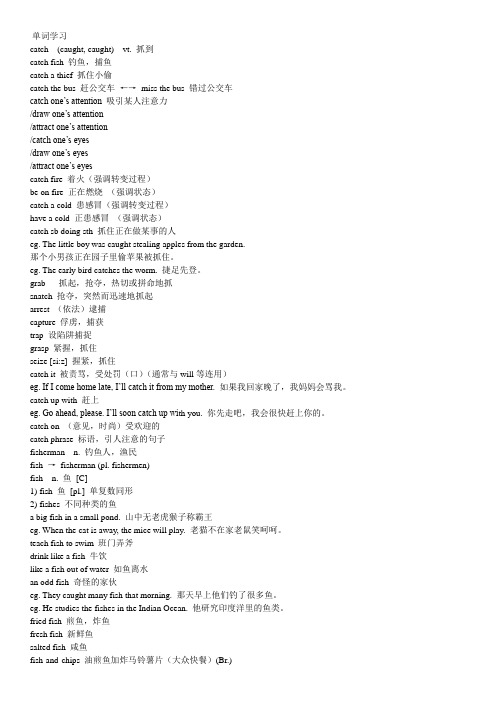
单词学习catch (caught, caught) vt. 抓到catch fish 钓鱼,捕鱼catch a thief 抓住小偷catch the bus 赶公交车←→miss the bus 错过公交车catch one’s attention 吸引某人注意力/draw one’s attention/attract one’s attention/catch one’s eyes/draw one’s eyes/attract one’s eyescatch fire 着火(强调转变过程)be on fire 正在燃烧(强调状态)catch a cold 患感冒(强调转变过程)have a cold 正患感冒(强调状态)catch sb doing sth 抓住正在做某事的人eg. The little boy was caught stealing apples from the garden.那个小男孩正在园子里偷苹果被抓住。
eg. The early bird catches the worm. 捷足先登。
grab 抓起,抢夺,热切或拼命地抓snatch 抢夺,突然而迅速地抓起arrest (依法)逮捕capture 俘虏,捕获trap 设陷阱捕捉grasp 紧握,抓住seize [si:z] 握紧,抓住catch it 被责骂,受处罚(口)(通常与will等连用)eg. If I come home late, I’ll catch it from my mother. 如果我回家晚了,我妈妈会骂我。
catch up with 赶上eg. Go ahead, please. I’ll soon catch up wi th you. 你先走吧,我会很快赶上你的。
catch on (意见,时尚)受欢迎的catch phrase 标语,引人注意的句子fisherman n. 钓鱼人,渔民fish →fisherman (pl. fishermen)fish n. 鱼[C]1) fish 鱼[pl.] 单复数同形2) fishes 不同种类的鱼a big fish in a small pond. 山中无老虎猴子称霸王eg. When the cat is away, the mice will play. 老猫不在家老鼠笑呵呵。
(完整版)新概念英语第二册第20课课文讲解
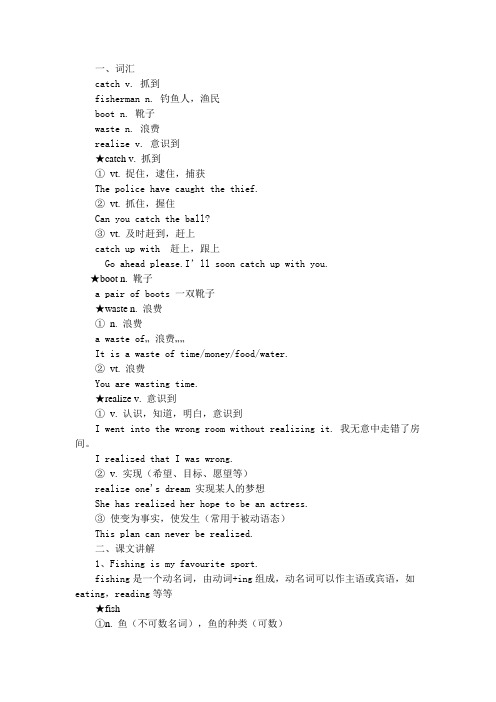
一、词汇catch v. 抓到fisherman n. 钓鱼人,渔民boot n. 靴子waste n. 浪费realize v. 意识到★catch v. 抓到①vt. 捉住,逮住,捕获The police have caught the thief.②vt. 抓住,握住Can you catch the ball?③vt. 及时赶到,赶上catch up with 赶上,跟上Go ahead please.I’ll soon catch up with you.★boot n. 靴子a pair of boots 一双靴子★waste n. 浪费①n. 浪费a waste of… 浪费……It is a waste of time/money/food/water.②vt. 浪费You are wasting time.★realize v. 意识到①v. 认识,知道,明白,意识到I went into the wrong room without realizing it. 我无意中走错了房间。
I realized that I was wrong.②v. 实现(希望、目标、愿望等)realize one's dream 实现某人的梦想She has realized her hope to be an actress.③使变为事实,使发生(常用于被动语态)This plan can never be realized.二、课文讲解1、Fishing is my favourite sport.fishing是一个动名词,由动词+ing组成,动名词可以作主语或宾语,如eating,reading等等★fish①n. 鱼(不可数名词),鱼的种类(可数)There are a lot of fishes(表示种类)in the sea.②v. 钓鱼, 捕鱼2、I often fish for hours without catching anything.for+时间表示一段时间for hours=for some hours 数小时without catching anything作为状语而出现, 表示结果状语。
新概念英语第二册课件Lesson20(共29页)

【Key structures】关键句型
• spend+时间+在某地 在某地度过……时间 • I spent a whole day in the room, but I
didn’t write a single word.
• after <conj.>+从句 在……之后 • After <prep.>+ doing 在…..之后 • After I went to school, I learned a lot of
★realize v. 意识到
• ① v. 认识,知道,明白,意识到 • I went into the wrong room without
realizing it. • ② v. 实现(希望、目标、愿望等) • realize one's dream 实现某人的梦想 • ③ 使变为事实,使发生(常用于被动语态) • This plan can never be realized.
• I was worried about my brother for he caught a serious cold.
• Instead of catching fish, they catch old boots and rubbish.
• instead of… 而不是… 可以放于句首或句尾 • I went to school instead of staying at home. • She bought a book for me instead of buying a dress.
新概念英语第二册:第20课课文详解及语法解析
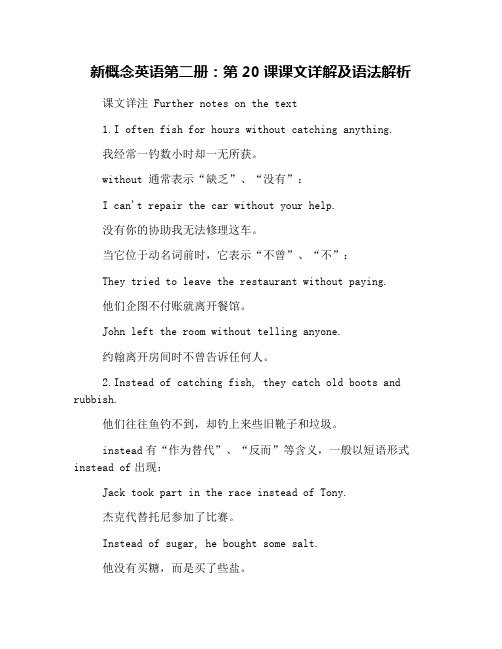
新概念英语第二册:第20课课文详解及语法解析课文详注 Further notes on the text1.I often fish for hours without catching anything.我经常一钓数小时却一无所获。
without 通常表示“缺乏”、“没有”:I can't repair the car without your help.没有你的协助我无法修理这车。
当它位于动名词前时,它表示“不曾”、“不”:They tried to leave the restaurant without paying.他们企图不付账就离开餐馆。
John left the room without telling anyone.约翰离开房间时不曾告诉任何人。
2.Instead of catching fish, they catch old boots and rubbish.他们往往鱼钓不到,却钓上来些旧靴子和垃圾。
instead有“作为替代”、“反而”等含义,一般以短语形式instead of出现:Jack took part in the race instead of Tony.杰克代替托尼参加了比赛。
Instead of sugar, he bought some salt.他没有买糖,而是买了些盐。
副词instead单独使用时一般出现在句尾:If you don't want a holiday in England, why don't you go to Australiainstead?如果你不想在英国度假,那你为什么不去澳大利亚呢?3.I am even less lucky.我的运气甚至还不及他们。
less是little的比较级,意为“不及”、“不如”、“更少”:Tom has got little chocolate, and Jack has got even less.汤姆只有一点儿巧克力,杰克则更少。
新概念英语第二册第20课
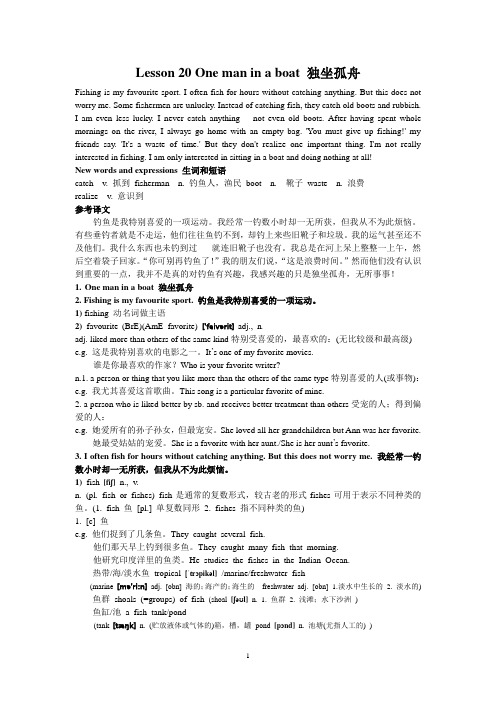
Lesson 20 One man in a boat 独坐孤舟Fishing is my favourite sport. I often fish for hours without catching anything. But this does not worry me. Some fishermen are unlucky. Instead of catching fish, they catch old boots and rubbish.I am even less lucky. I never catch anything -- not even old boots. After having spent whole mornings on the river, I always go home with an empty bag. 'You must give up fishing!' my friends say. 'It's a waste of time.' But they don't realize one important thing. I'm not really interested in fishing. I am only interested in sitting in a boat and doing nothing at all!New words and expressions 生词和短语catch v. 抓到fisherman n. 钓鱼人,渔民boot n. 靴子waste n. 浪费realize v. 意识到参考译文钓鱼是我特别喜爱的一项运动。
我经常一钓数小时却一无所获,但我从不为此烦恼。
有些垂钓者就是不走运,他们往往鱼钓不到,却钓上来些旧靴子和垃圾。
我的运气甚至还不及他们。
我什么东西也未钓到过-- 就连旧靴子也没有。
新概念英语第二册第20课 one man in a boat 独坐孤舟
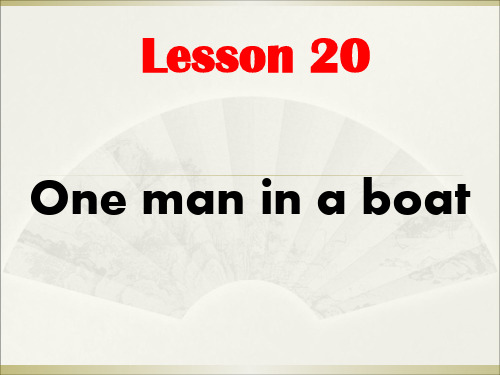
Lesson 20 One man in a boat
1.What is your favourite pastime?
sports reading
Hitch-hiking
mountaineering singing
movies
surfing biking
painting
dancing
2.How much time do you usually spend on your pastime every week? 3.Are you good at it? How?
接名词作宾语 接不定式作宾语 记得将来要做的动作 努力去做某事 对要做的事表示遗憾 企图(打算)做某事
remember try
记得过去发生的动作 试着去做、尝试改变 对做过的事表示后悔 意味着……
regret
mean
go on
forget
继续做未完成的事情
忘记以前曾做过某事
做完一件事后,接着做 另一件
⑥用于虚拟语气
without有时可表示条件,引出虚拟语气,与but for大致同 义。如 Without [But for] appropriate software, a computer would be a mere box. 如果没有恰当的软件,电脑只是一个空盒子罢了 Without [But for] you, our project wouldn’t have succeeded. 如果没有你的话,我们的计划就无法成功了。
新概念英语第二册lesson20
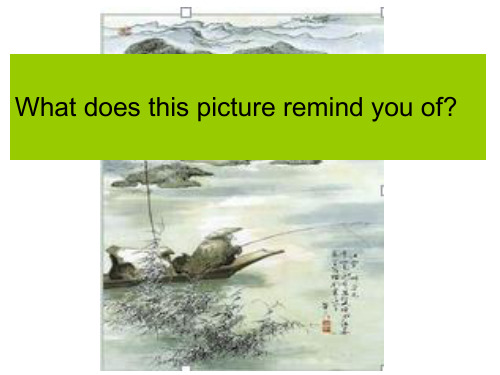
Listen and then answer the questions.
1.What is the writer’s favourite sport? 2.What do some unlucky fishermen catch? 3.Does he ever catch anything? 4.Is he really interested in fishing? 5.What is the only thing that interests him?
a.) Getting up early is a good habit. b.) Fishing is Tom’s favorite hobby. c.)Arguing with him is a waste of time.
Predicative
系动词又称连系动词,不 单独作谓语,必须与表语 连用构成系表结构。
What does this picture remind you of?
《江雪》的不同版本
River snow A hundred mountains and no bird,
A thousand paths without a footprint;
A little boat, a bamboo cloak, An old man fishing in the cold river-snow.
★fisherman n. 钓鱼人,渔民 fish→ fisherman (pl.fishermen) [注]不要忘了er 1)fish 鱼 单复数同形 They caught many fish that morning. 2)fishes 不同种类的鱼 3)fish v. 钓鱼 like enjoy I am fond of am keen on
新概念英语第二册 Lesson 20

fish hook 钩
fishing line
fishing net 网
【New words and expressions】 catch fisherman boot waste realize v. 抓到 n. 钓鱼人,渔民 n. 靴子 n. 浪费 v. 意识到
★catch v. 抓到(caught; caught) ① vt. 捉住,逮住,捕获 catch fish, catch thief The police have caught the thief. ② vt. 抓住,握住 Can you catch the ball? ③ vt. 及时赶到,赶上 catch the bus:赶车 ----- miss the bus 错过车 ④ catch的一些固定用法 catch a cold:染上感冒---have a cold catch fire:着火(动作)---be on fire(状态) catch one’s attentionh 摒住呼吸 catch sight(看见) of = see : 看见
★fisherman n. 钓鱼人, 渔民 fish→ fisherman [注]不要忘了er哦 1)fish 鱼 (pl.) 单复数同形 They caught many fish that morning. 2)fishes 不同种类的鱼 He studies the fishes in the Indian Ocean drink like a fish 牛饮 like a fish out of water 如鱼离水 fries fish fresh fish salted fish 3)fish v. 钓鱼 go fishing/swimming/shopping fishing in troubled water 浑水摸鱼
逐句精讲新概念英语第二册:第20课独坐孤舟
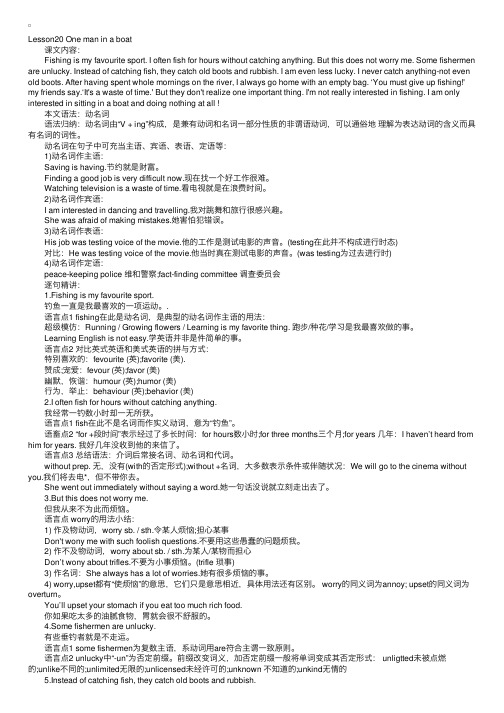
Lesson20 One man in a boat 课⽂内容: Fishing is my favourite sport. I often fish for hours without catching anything. But this does not worry me. Some fishermen are unlucky. Instead of catching fish, they catch old boots and rubbish. I am even less lucky. I never catch anything-not even old boots. After having spent whole mornings on the river, I always go home with an empty bag. ‘You must give up fishing!' my friends say.‘It's a waste of time.' But they don't realize one important thing. I'm not really interested in fishing. I am only interested in sitting in a boat and doing nothing at all ! 本⽂语法:动名词 语法归纳:动名词由“V + ing”构成,是兼有动词和名词⼀部分性质的⾮谓语动词,可以通俗地理解为表达动词的含义⽽具有名词的词性。
动名词在句⼦中可充当主语、宾语、表语、定语等: 1)动名词作主语: Saving is having.节约就是财富。
Finding a good job is very difficult now.现在找⼀个好⼯作很难。
Watching television is a waste of time.看电视就是在浪费时间。
新概念英语第二册第20课完整ppt课件

精选ppt
Lesson20 One man in a boat
• Fishing is my favourite sport.
• fish + ing = fishing • v. + ing = 动名词 (做主语) • I often fish for hours without catching
anything. • fish (v.) 钓鱼 • for + 一段时间 • without (prep.)没有 • He left without telling me. • catching 动名词做精宾选pp语t
• But this does not worry me.
• worry (v.) 使…担心
精选ppt
• ☺ 懂得,理解 = understand • catch the sentence
• ☺catch up with sb. • 赶上… • catch one’s atth fire • 着火
精选ppt
• 2. fish ☺(c. n.) 鱼
and doing nothing at all ! • only 只是 • = just • not at all
精选ppt
• Fishing is my favourite sport. I often fish for hours without catching anything. But this does not worry me. Some fishermen are unlucky. Instead of catching fish, they catch old boots and rubbish. I am even less lucky. I never catch anything-not even old boots.
新概念英语第二册课堂笔记:第20课
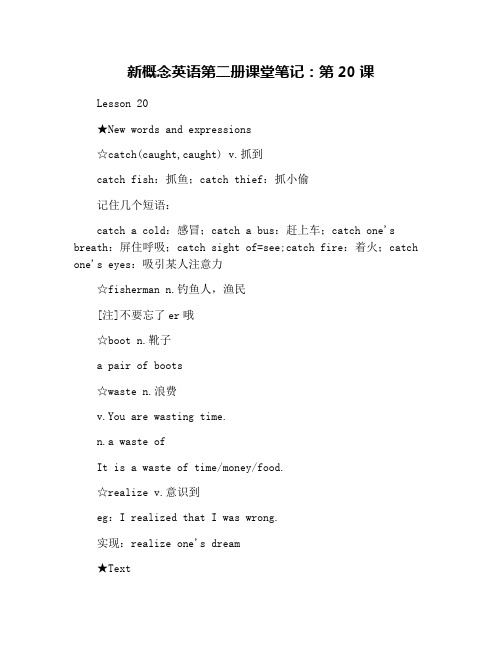
新概念英语第二册课堂笔记:第20课Lesson 20★New words and expressions☆catch(caught,caught) v.抓到catch fish:抓鱼;catch thief:抓小偷记住几个短语:catch a cold:感冒;catch a bus:赶上车;catch one's breath:屏住呼吸;catch sight of=see;catch fire:着火;catch one's eyes:吸引某人注意力☆fisherman n.钓鱼人,渔民[注]不要忘了er哦☆boot n.靴子a pair of boots☆waste n.浪费v.You are wasting time.n.a waste ofIt is a waste of time/money/food.☆realize v.意识到eg:I realized that I was wrong.实现:realize one's dream★TextOne man in a boatFishing is my favourite sport.I often fish for hours without catching anything.But this does not worry me.Some fisherman are unlucky.Instead of catching fish,they catch old boots and rubbish.I am even less lucky.I never catchanything-not even old boots.After having spent whole morning on the river,I always go home with an empty bay.'You must give up fishing!'my friends say.'It's a waste of time.'But they don't realize one important thing.I'm not really interested in fishing.I am only interested in sitting in a boat and doing nothing at all!●本课的重点是-ing形式☆fish n.鱼:一般情况下作为不可数名词用eg:I have bought some fish.在表示种类时为可数名词eg:There are a lot of fishes in the sea.v.钓鱼-->n.fishing主语通常由名词和代词充当。
逐句精讲新概念英语第二册第20课 独坐孤舟
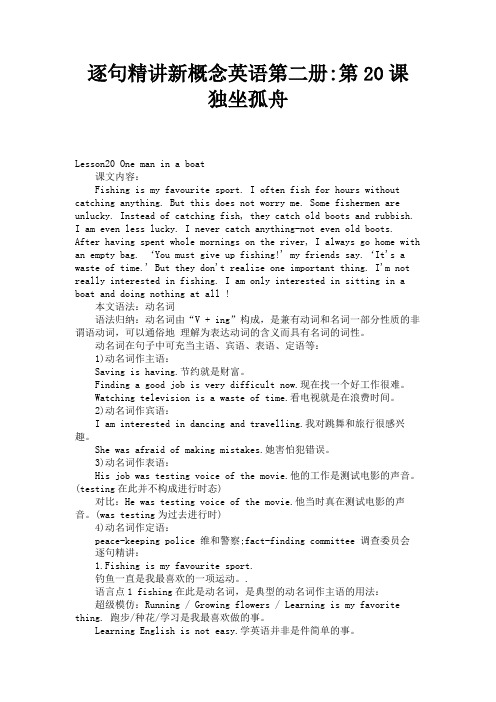
逐句精讲新概念英语第二册:第20课独坐孤舟Lesson20 One man in a boat课文内容:Fishing is my favourite sport. I often fish for hours without catching anything. But this does not worry me. Some fishermen are unlucky. Instead of catching fish, they catch old boots and rubbish.I am even less lucky. I never catch anything-not even old boots.After having spent whole mornings on the river, I always go home with an empty bag. ‘You must give up fishing!' my friends say.‘It's a waste of time.' But they don't realize one important thing. I'm not really interested in fishing. I am only interested in sitting in a boat and doing nothing at all !本文语法:动名词语法归纳:动名词由“V + ing”构成,是兼有动词和名词一部分性质的非谓语动词,可以通俗地理解为表达动词的含义而具有名词的词性。
动名词在句子中可充当主语、宾语、表语、定语等:1)动名词作主语:Saving is having.节约就是财富。
Finding a good job is very difficult now.现在找一个好工作很难。
新概念英语第二册20课 One man in a boat

instead of doing...they did...没 有做...而是做...
• instead of going to the cinema, he stayed at home.
• go shopping/go to the park. • read a book/read a magazine. • go to school/go fishing • have dinner at home/go to the
Lesson 20
One man in a boat
What i Watching TV? / playing vidio games? /going shopping? /reading books?
How do you think of fishing? Are you interested in it ?
realize 和understand
• realize: become aware, sometimes suddenly
• (通过感官或是意识作用的) • understand: 懂,理解 (通过一定的解
释,思考,学习了一定的知识后或是有 过同样的经历,感觉而知道) • I realized he was mad. • He didn't realize that he had made a mistake. • 他没有意识到自己犯了个错误
waste
• v. 浪费 • We should not waste time. • n. 浪费 • It's only a waste of time to speak to
her. • 和她说话纯粹是浪费时间。 • a waste of… 浪费…… • It is a waste of
- 1、下载文档前请自行甄别文档内容的完整性,平台不提供额外的编辑、内容补充、找答案等附加服务。
- 2、"仅部分预览"的文档,不可在线预览部分如存在完整性等问题,可反馈申请退款(可完整预览的文档不适用该条件!)。
- 3、如文档侵犯您的权益,请联系客服反馈,我们会尽快为您处理(人工客服工作时间:9:00-18:30)。
Lesson 20 One man in a boat 独坐孤舟Fishing is my favourite sport. I often fish for hours without catching anything. But this does not worry me. Some fishermen are unlucky. Instead of catching fish, they catch old boots and rubbish.I am even less lucky. I never catch anything -- not even old boots. After having spent whole mornings on the river, I always go home with an empty bag. 'You must give up fishing!' my friends say. 'It's a waste of time.' But they don't realize one important thing. I'm not really interested in fishing. I am only interested in sitting in a boat and doing nothing at all!New words and expressions 生词和短语catch v. 抓到fisherman n. 钓鱼人,渔民boot n. 靴子waste n. 浪费realize v. 意识到参考译文钓鱼是我特别喜爱的一项运动。
我经常一钓数小时却一无所获,但我从不为此烦恼。
有些垂钓者就是不走运,他们往往鱼钓不到,却钓上来些旧靴子和垃圾。
我的运气甚至还不及他们。
我什么东西也未钓到过-- 就连旧靴子也没有。
我总是在河上呆上整整一上午,然后空着袋子回家。
“你可别再钓鱼了!”我的朋友们说,“这是浪费时间。
”然而他们没有认识到重要的一点,我并不是真的对钓鱼有兴趣,我感兴趣的只是独坐孤舟,无所事事!1.One man in a boat 独坐孤舟2. Fishing is my favourite sport. 钓鱼是我特别喜爱的一项运动。
1) fishing 动名词做主语2) favourite(BrE)(AmE favorite)[ˈfeivərit]adj., n.adj. liked more than others of the same kind特别受喜爱的,最喜欢的:(无比较级和最高级) e.g. 这是我特别喜欢的电影之一。
It’s one of my favorite movies.谁是你最喜欢的作家?Who is your favorite writer?n.1. a person or thing that you like more than the others of the same type特别喜爱的人(或事物):e.g. 我尤其喜爱这首歌曲。
This song is a particular favorite of mine.2. a person who is liked better by sb. and receives better treatment than others受宠的人;得到偏爱的人:e.g. 她爱所有的孙子孙女,但最宠安。
She loved all her grandchildren but Ann was her favorite.她最受姑姑的宠爱。
She is a favorite with her aunt./She is her aunt’s favorite.3. I often fish for hours without catching anything. But this does not worry me. 我经常一钓数小时却一无所获,但我从不为此烦恼。
1) fish[fiʃ]n., v.n. (pl. fish or fishes) fish是通常的复数形式,较古老的形式fishes可用于表示不同种类的鱼。
(1. fish 鱼[pl.] 单复数同形2. fishes 指不同种类的鱼)1. [c] 鱼e.g. 他们捉到了几条鱼。
They caught several fish.他们那天早上钓到很多鱼。
They caught many fish that morning.他研究印度洋里的鱼类。
He studies the fishes in the Indian Ocean.热带/海/淡水鱼tropical[ˈtrɔpikəl]/marine/freshwater fish(marine [mə'ri:n]adj. [obn] 海的;海产的;海生的freshwater adj. [obn] 1.淡水中生长的2. 淡水的) 鱼群shoals (=groups) of fish (shoal [ʃəʊl]n. 1. 鱼群2. 浅滩;水下沙洲)鱼缸/池a fish tank/pond(tank [tæŋk]n. (贮放液体或气体的)箱,槽,罐pond [pɔnd]n. 池塘(尤指人工的) )a big fish in a small pond (字面意思:一个小池塘里的一条大鱼)山中无老虎,猴子称霸王=When the cat is away, the mice will play. (当猫不在,老鼠玩得自在)teach fish to swim 班门弄斧drink like a fish 牛饮(很能喝水)a fish out of water 离水之鱼;在陌生环境不得其所的人like a fish out of water 如鱼离水an odd / a queer fish(old-fashioned, BrE) a person who is slightly strange or crazy奇怪的家伙;古怪的人;有些荒唐的人(queer[kwiə]adj. 奇怪的;反常的)2. [u] the flesh of fish eaten as food鱼肉e.g. fried fish 煎鱼,炸鱼fresh fish 鲜鱼salted fish 咸鱼smoked fish 熏鱼(salt [sɔ:lt]n. [u] 盐;食盐vt. [usually passive] 在(食物)中放盐)fish and chips n. [u] (大众快餐) (BrE) 炸鱼加土豆条;炸鱼薯条e.g. Some people eat fish on Fridays. 有些人在星期五吃鱼。
(天主教的人习惯在星期五吃鱼代替吃肉表虔诚)v.1. vi. ~(for sth)to try to catch fish with a hook[huk], nets, etc.钓鱼;捕鱼:e.g. 你可以在这条小溪钓鳟鱼。
You can fish for trout in this stream.我喜欢钓鱼。
I like fishing./I enjoy fishing./I am fond of fishing./I am keen on fishing. (be keen on sth./doing sth. 渴望;热切;热衷于做某事)(trout [traʊt]n. [c, u] (pl. trout) 鲑;鲑鳟鱼;鳟鱼) (stream [stri:m]n. 小河;溪)2.(go fishing) to spend time fishing for pleasure钓鱼;捕鱼:e.g. 咱们这个周末去钓鱼吧。
Let’s go fishing this weekend.去游泳go swimming 去购物go shopping3. vt. to try to catch fish in the area of water mentioned在…捕鱼(或钓鱼)e.g. 他们在湖里钓鱼。
They fished the lake for fish.混水摸鱼fish in troubled waterPhrv. fish for sth. to try to get sth., or to find out sth., although you are pretending not to旁敲侧击地打听;转弯抹角地谋取fish for fame and compliments ([ˈkɔmplimənt]n. 1. [c] 赞扬;称赞2. (compliments) [pl.]问候;致意;祝贺)沽名钓誉fish for information转弯抹角地打听情况2) without [wiˈðaut]prep., adv.prep. (含否定含义) 可放在句首,句尾prep.+n./v.-ing/pron.1. not having, experiencing or showing sth. 没有;缺乏:e.g. 没有你的帮助我无法修理这车。
I can’t repair the car without your help. (名词作介词宾语)没有你我活不下去。
I cannot live without you. (代词作介词宾语)没有水鱼活不了。
Fish cannot live without water. (名词作介词宾语)2. ~(sb.) doing sth. not doing the action mentioned不(做某事);无;没e.g. 他们企图不付账就离开餐馆。
They tried to leave the restaurant without paying.我不是想要批评谁,只是认为你本可以做得更好一些。
Without wanting to criticize, I think you could have done better.动名词作介词宾语,要注意是在前后主语一致的情况下,如:e.g. 他一句话也没说就走了。
He went out without saying anything.= He went out and he didn’t say anything.= He went out without saying any wordsadv. not having, or showing sth. 没有;缺乏:e.g. 你要不要带洗澡间的房间?Do you want a room with a bath or one without?我相信我们能凑合的。
